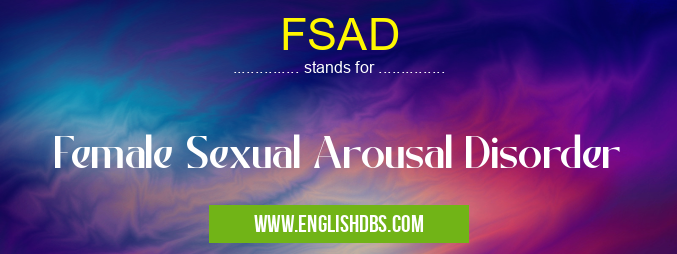What does FSAD mean in PHYSIOLOGY
FSAD or Female Sexual Arousal Disorder is a sexual dysfunction disorder affecting women of all ages, and is characterized by an inability to achieve adequate lubrication or orgasm, though desire may still be present. While there can be multiple underlying causes and factors for FSAD, the condition can be treated with successful medical intervention. In this article, we will discuss the meaning of FSAD, its full form and different therapies and treatments available for managing it.

FSAD meaning in Physiology in Medical
FSAD mostly used in an acronym Physiology in Category Medical that means Female Sexual Arousal Disorder
Shorthand: FSAD,
Full Form: Female Sexual Arousal Disorder
For more information of "Female Sexual Arousal Disorder", see the section below.
» Medical » Physiology
Meaning of FSAD
Female Sexual Arousal Disorder (FSAD) is a health condition characterized by an inability to become aroused or reach orgasm during sexual activities despite feeling aroused before engaging in them. The lack of arousal can occur even when there is no physical cause for it and the woman experiences little to no pleasure during sex despite having a desire to do so. It’s important to note that FSAD should not be confused with low libido which refers to a lack of desire for sex altogether rather than an inability to experience pleasure during sex.
Full Form of FSAD
The full form of FSAD is Female Sexual Arousal Disorder. This type of sexual dysfunction in women often goes undiagnosed because many people see it as something that should not require medical attention. However, since the disorder can cause emotional distress along with physical discomfort, it's important to seek out professional help if you think you may be suffering from FSAD.
Treatments Available For Managing Fsad
Fortunately, there are various ways of managing and treating Female Sexual Arousal Disorder (FSAD). Generally speaking, treatment begins with identifying any possible psychological triggers such as stress or anxiety that may influence your level of arousal or pleasure. Psychological treatments such as cognitive-behavioral therapy (CBT) may also help improve communication between partners and create a better understanding of each other’s needs. If there are any underlying medical factors contributing to FSAD such as diabetes or high blood pressure then these should also be addressed first before moving on to more specific treatments such as medications or lifestyle changes like exercise or getting enough sleep each night. In addition, many doctors recommend using certain products like topical creams or lubricants prior to engaging in sexual activities in order to increase comfort levels.
Essential Questions and Answers on Female Sexual Arousal Disorder in "MEDICAL»PHYSIOLOGY"
What is Female Sexual Arousal Disorder (FSAD)?
Female Sexual Arousal Disorder (FSAD) is a type of sexual dysfunction that affects women. It can cause problems with becoming aroused or maintaining arousal during sexual activity. Symptoms may include difficulty in achieving arousal, lack of sexual desire, and inability to reach orgasm.
What causes FSAD?
FSAD can result from physical conditions such as hormonal imbalances, diabetes or nerve damage due to injury or surgery. Psychological conditions such as depression, anxiety, and stress can also contribute to FSAD. Additionally, certain medications can play a role in the development of the disorder.
Who is at risk for developing FSAD?
While anyone can develop FSAD, some factors that may put someone at higher risk include aging, menopause-related changes in estrogen levels, long-term health issues such as diabetes or hypertension, and relationship issues such as communication problems between partners.
Are there any treatments for FSAD?
Yes - many treatments are available for addressing female sexual arousal disorder. Depending on the individual situation, options include counseling/therapy (e.g., cognitive-behavioral therapy), medications (e.g., hormone replacement therapy), lifestyle modifications (e.g., diet and exercise changes), supplements (e.g., herbs), and medical devices (e.g., vibrators).
Is it normal to experience this kind of problem?
Yes - Female Sexual Arousal Disorder is quite common among women of all ages and occurs in an estimated 6-9% of premenopausal women globally. If you’re having trouble with your sex life due to low libido or difficulty with arousal or reaching orgasm, you should talk to your doctor about treatment options that will help you address these symptoms.
Are there any home remedies I can try for FSAD?
While incorporating dietary changes and lifestyle modifications like regular exercise have been found to help improve overall libido levels in people with Female Sexual Arousal Disorder symptoms, it’s important to note that these should always be done in addition to any professional advice from your doctor - not as a substitute.
Can stress cause Female Sexual Arousal Disorder?
Yes - psychological conditions such as stress and anxiety can play a significant role in the development of this condition due to their influence on hormones like oxytocin which control sexual arousal.
Can medication help treat FSAD?
In some cases yes - depending on what’s causing the problem medically certain medications like hormone replacement therapy could offer some relief from symptoms of Female Sexual Arousal Disorders.
Final Words:
Female Sexual Arousal Disorder (FSAD) is an often misunderstood health issue experienced by women all over the world that affects their ability to enjoy sexual activity despite desire being present beforehand. Although potentially distressing for those affected by it, this condition can easily be managed through both psychological interventions such as CBT as well as medical interventions like medications and lifestyle changes depending on what triggers are identified as causing problems within each individual case. With proper treatment FSAD can easily be managed effectively allowing individuals affected by it regain control over their sex lives again.
